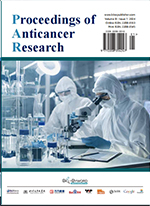Abstract
Doxorubicin is a commonly used chemotherapy drug for cancer treatment, although its effectiveness varies across different cancer types. p53 is a key factor involved in cell death induced by therapeutic agents, and it can be upregulated by doxorubicin, exhibiting a function of apoptosis. To further investigate the mechanism between p53 and doxorubicin, this study explored whether p53 plays a role in doxorubicin-induced cell death in the colorectal cancer line HCT116. The findings revealed that p53 was upregulated in HCT116 cells when treated with doxorubicin, and the knockdown of p53 decreased the sensitivity of HCT116 cells to doxorubicin. These results suggest that p53 plays an important role in doxorubicin-induced cell death in HCT116 cells, potentially contributing to more effective treatment approaches.
References
Torre LA, Siegel RL, Ward EM, et al., 2016, Global Cancer Incidence and Mortality Rates and Trends – An Update. Cancer Epidemiol Biomarkers Prev, 25(1): 16–27. https://doi.org/10.1158/1055-9965.EPI-15-0578
Peng M, Darko KO, Tao T, et al., 2017, Combination of Metformin with Chemotherapeutic Drugs via Different Molecular Mechanisms. Cancer Treat Rev, 54: 24–33. https://doi.org/10.1016/j.ctrv.2017.01.005
Carvalho C, Santos RX, Cardoso S, et al., 2009, Doxorubicin: The Good, the Bad and the Ugly Effect. Curr Med Chem, 16(25): 3267–3285. https://doi.org/10.2174/092986709788803312
Marei HE, Althani A, Afifi N, et al., 2021, p53 Signaling in Cancer Progression and Therapy. Cancer Cell Int, 21(1): 703. https://doi.org/10.1186/s12935-021-02396-8
Khan FM, Saleh E, Alawadhi H, et al., 2018, Inhibition of Exosome Release by Ketotifen Enhances Sensitivity of Cancer Cells to Doxorubicin. Cancer Biol Ther, 19(1): 25–33. https://doi.org/10.1080/15384047.2017.1394544
Sritharan S, Sivalingam N, 2021, A Comprehensive Review on Time-Tested Anticancer Drug Doxorubicin. Life Sci, 278: 119527. https://doi.org/10.1016/j.lfs.2021.119527
Miyashita T, Krajewski S, Krajewska M, et al., 1994, Tumor Suppressor p53 is a Regulator of bcl-2 and bax Gene Expression In Vitro and In Vivo. Oncogene, 9(6): 1799–1805.
Aubrey BJ, Kelly GL, Janic A, et al., 2018, How Does p53 Induce Apoptosis and How Does This Relate to p53-Mediated Tumour Suppression? Cell Death Differ, 25(1): 104–113. https://doi.org/10.1038/cdd.2017.169
Yeh PY, Chuang S-E, Yeh K-H, et al., 2004, Phosphorylation of p53 on Thr55 by ERK2 is Necessary for Doxorubicin-Induced p53 Activation and Cell Death. Oncogene, 23(20): 3580–3588. https://doi.org/10.1038/sj.onc.1207426
Thijssen R, Diepstraten ST, Moujalled D, et al., 2021, Intact TP-53 Function is Essential for Sustaining Durable Responses to BH3-Mimetic Drugs in Leukemias. Blood, 137(20): 2721–2735. https://doi.org/10.1182/blood/2020010167
